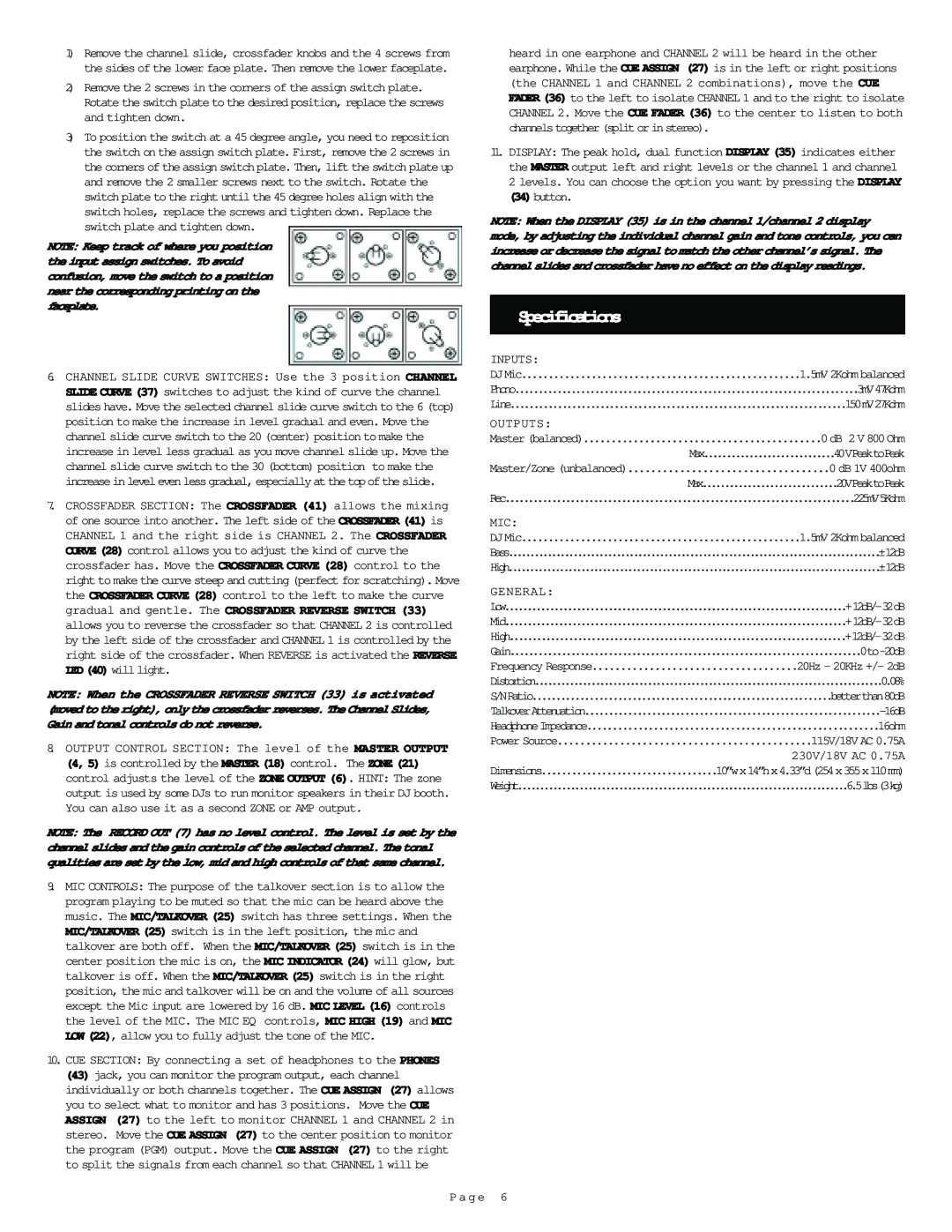
1)Remove the channel slide, crossfader knobs and the 4 screws from the sides of the lower face plate. Then remove the lower faceplate.
2)Remove the 2 screws in the corners of the assign switch plate. Rotate the switch plate to the desired position, replace the screws and tighten down.
3)To position the switch at a 45 degree angle, you need to reposition the switch on the assign switch plate. First, remove the 2 screws in the corners of the assign switch plate. Then, lift the switch plate up and remove the 2 smaller screws next to the switch. Rotate the switch plate to the right until the 45 degree holes align with the switch holes, replace the screws and tighten down. Replace the switch plate and tighten down.
NOTE: Keep track of where you position the input assign switches. To avoid confusion, move the switch to a position near the corresponding printing on the faceplate.
6.CHANNEL SLIDE CURVE SWITCHES: Use the 3 position CHANNEL SLIDE CURVE (37) switches to adjust the kind of curve the channel slides have. Move the selected channel slide curve switch to the 6 (top) position to make the increase in level gradual and even. Move the channel slide curve switch to the 20 (center) position to make the increase in level less gradual as you move channel slide up. Move the channel slide curve switch to the 30 (bottom) position to make the increase in level even less gradual, especially at the top of the slide.
7.CROSSFADER SECTION: The CROSSFADER (41) allows the mixing of one source into another. The left side of the CROSSFADER (41) is CHANNEL 1 and the right side is CHANNEL 2. The CROSSFADER CURVE (28) control allows you to adjust the kind of curve the crossfader has. Move the CROSSFADER CURVE (28) control to the right to make the curve steep and cutting (perfect for scratching). Move the CROSSFADER CURVE (28) control to the left to make the curve gradual and gentle. The CROSSFADER REVERSE SWITCH (33) allows you to reverse the crossfader so that CHANNEL 2 is controlled by the left side of the crossfader and CHANNEL 1 is controlled by the right side of the crossfader. When REVERSE is activated the REVERSE LED(40) will light.
NOTE: When the CROSSFADER REVERSE SWITCH (33) is activated (movedtotheright),onlythecrossfaderreverses. TheChannelSlides, Gain and tonal controls do not reverse.
8.OUTPUT CONTROL SECTION: The level of the MASTER OUTPUT (4, 5) is controlled by the MASTER (18) control. The ZONE (21) control adjusts the level of the ZONE OUTPUT (6). HINT: The zone output is used by some DJs to run monitor speakers in their DJ booth. You can also use it as a second ZONE or AMP output.
NOTE: The RECORD OUT (7) has no level control. The level is set by the channelslides and the gain controlsof the selectedchannel. The tonal qualities are set by the low, mid and high controls of that same channel.
9.MIC CONTROLS: The purpose of the talkover section is to allow the program playing to be muted so that the mic can be heard above the music. The MIC/TALKOVER (25) switch has three settings. When the MIC/TALKOVER (25) switch is in the left position, the mic and talkover are both off. When the MIC/TALKOVER (25) switch is in the center position the mic is on, the MIC INDICATOR (24) will glow, but talkover is off. When the MIC/TALKOVER (25) switch is in the right position, the mic and talkover will be on and the volume of all sources except the Mic input are lowered by 16 dB. MIC LEVEL (16) controls the level of the MIC. The MIC EQ controls, MIC HIGH (19) and MIC LOW (22), allow you to fully adjust the tone of the MIC.
10.CUE SECTION: By connecting a set of headphones to the PHONES (43) jack, you can monitor the program output, each channel individually or both channels together. The CUE ASSIGN (27) allows you to select what to monitor and has 3 positions. Move the CUE ASSIGN (27) to the left to monitor CHANNEL 1 and CHANNEL 2 in stereo. Move the CUE ASSIGN (27) to the center position to monitor the program (PGM) output. Move the CUE ASSIGN (27) to the right to split the signals from each channel so that CHANNEL 1 will be
heard in one earphone and CHANNEL 2 will be heard in the other earphone. While the CUE ASSIGN (27) is in the left or right positions (the CHANNEL 1 and CHANNEL 2 combinations), move the CUE FADER (36) to the left to isolate CHANNEL 1 and to the right to isolate CHANNEL 2. Move the CUE FADER (36) to the center to listen to both channelstogether(splitorinstereo).
11.DISPLAY: The peak hold, dual function DISPLAY (35) indicates either the MASTER output left and right levels or the channel 1 and channel 2 levels. You can choose the option you want by pressing the DISPLAY (34)button.
NOTE: When the DISPLAY (35) is in the channel 1/channel 2 display mode, by adjusting the individual channel gain and tone controls, you can increaseor decreasethe signalto matchthe otherchannel’ssignal. The channel slides and crossfaderhave no effect on the display readings.
Specifications
INPUTS: |
|
DJMic | 1.5mV 2Kohmbalanced |
Phono | 3mV47Kohm |
Line | 150mV27Kohm |
OUTPUTS: |
|
Master (balanced) | 0 dB 2 V 800 Ohm |
Max | 40VPeaktoPeak |
Master/Zone (unbalanced) | 0 dB 1V 400ohm |
Max | 20VPeaktoPeak |
Rec | 225mV5Kohm |
MIC: |
|
DJMic | 1.5mV 2Kohmbalanced |
Bass | ±12dB |
High | ±12dB |
GENERAL: |
|
Low | |
Mid | |
High | |
Gain | |
Frequency Response | 20Hz - 20KHz +/- 2dB |
Distortion | 0.08% |
S/NRatio | betterthan80dB |
TalkoverAttenuation | |
HeadphoneImpedance | 16ohm |
Power Source | 115V/18V AC 0.75A |
| 230V/18V AC 0.75A |
Dimensions | 10”wx14”hx4.33”d(254x355x110mm) |
Weight | 6.5 lbs (3 kg) |
Page 6
